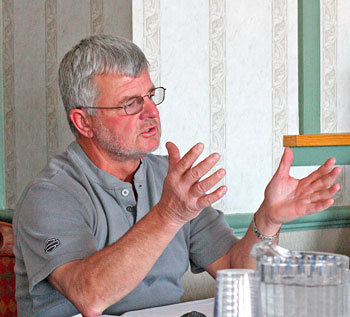New Flexibility in Lobster Entry Programs to Nudge Wait Lists
by Laurie Schreiber

Jon Carter, Bar Harbor. “It might make people feel better if they knew they were number 33 on the list instead of number 63 on the list, if 30 people said they have no intention of coming out for their license.” © Photo by Sam Murfitt
BAR HARBOR – Two of the state’s lobster zone councils have taken advantage of a new law that allows them to return to entry:exit ratios based on license numbers rather than trap tag numbers.
The lobster fishery’s limited entry system was put in place about 16 years ago, with the goal of reducing fishing effort. The system established entry:exit ratios – for a certain number of licenses retired, one new license would be issued.
As the program matured, the goal was changed to achieve a reduction in trap tags, rather than licenses, since tags represent the actual effort in the water.
The new law is intended to provide the zones with more flexibility, and to have some movement on the lists of people who have completed apprenticeship training for the fishery and are now waiting for their chance to get a license.
Zones A and B opted to change back to licenses as their systems’ currency, rather than tags. At their Sept. 25 meeting, the Zone B council voted in a 5:1 ratio based on licenses. At the same time, some long-time apprentices who were attending the meeting asked the council to consider changing the ratio from to 3:1, in order to further nudge along the zone’s wait list.
The council duly sent out a survey to members, asking: “By what exit ratio (number of licenses issued as licenses are retired) should the new entry be limited?” Respondents were given the choice of 5:1 and 3:1.
At their Nov. 13 meeting, the Zone B council learned that two-thirds of members wanted to keep the ratio at 5:1.
“There’s not a lot to talk about. Sixty-three percent wanted it to stay,” said Zone B chairman Jon Carter.
The council can revisit the issue whenever it wants to. But the consensus was that the large response to the survey – 219 responders out of 497 zone members – seemed to indicate strong feelings among the folks who supported the status quo.
One council member, David Horner, pointed out that the switch to license-counting to tag-counting would itself expedite the waiting list, perhaps as much as doubling the number of new entrants each year.
However, Horner said he supported the switch to 3:1.
For many, both on the council and in the audience, one of the discussion points revolved around whether folks who have been on the waiting list for a long time were even interested in obtaining a license anymore.
There was a proposal to contact people on the list and ask them that question. “It might make people feel better if they knew they were number 33 on the list instead of number 63 on the list, if 30 people said they have no intention of coming out for their license,” said Carter.
But many agreed that just asking the waiters if they still want to be on the list wouldn’t do much good, because they had no particular incentive for being taken off.
Other proposals included establishing a mandatory annual renewal of interest, and perhaps a fee, to stay on the list. Those kinds of requirements, folks said, would actively force a statement of intent.
Scott Beede of Aurora said he’s been on the Zone B list for six years. At age 48, Beede has well-established businesses in Aurora, including a guide service and a game ranch. But, he said, he went into the lobster apprenticeship program in order to fish with his stepfather, who needed help. He had fished with his grandfather, and he enjoyed the return to the sea.
He said he doesn’t anticipate he’ll ever reach the top of the list, at the rate it’s moving. At the same time, Beede said, it’s unclear how many of the people on the list have actually retained their interest, after years of waiting.
“Sixty-three people might wind up to be five or six people who are actually serious about it,” he said.
“But you can’t really say that for sure,” said Carter, who later added, “We didn’t do this to penalize people. We were told by the science community that we had to do it. It wasn’t something that a bunch of fishermen sat down at a table and said, ‘We want to keep people out of the fishery.’”
There was also some discussion around the idea that any new license-holder should have to show a history of some minimum threshold of landings thereafter – as opposed to simply holding onto another latent license. And there was discussion around an idea to have mandatory drug testing for license-holders.
